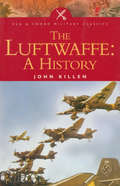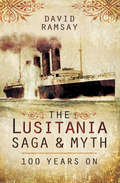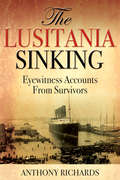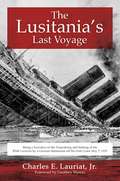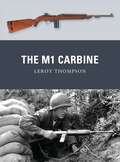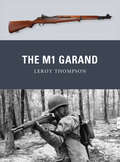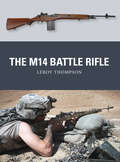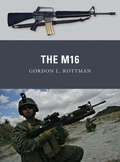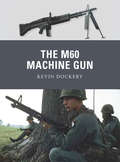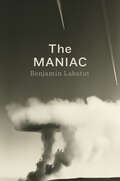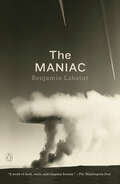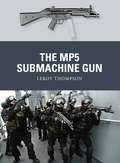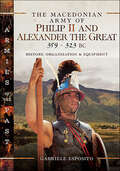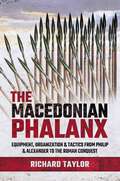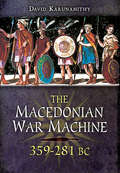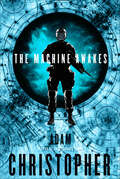- Table View
- List View
The Luftwaffe: A History (Pen & Sword Military Classics)
by John KillenAn extensive history of the rise and fall of Nazi Germany&’s air force. In his thoroughly researched study, John Killen examines German air power between 1914 and 1945, from the early days of flying when Immelmann, Boelke, Richtofen, and other First World War aces fought and died to give Germany air supremacy, to the nightmare existence of the Luftwaffe as the Third Reich plunged headlong to destruction. Here are the aircraft: the frail biplanes and triplanes of the Kaiser&’s war; the great Lufthansa aircraft and airships of the turbulent Thirties; the monoplanes designed to help Hitler in his conquest of Europe. Here are the generals who forged the air weapon of the Luftwaffe: the swaggering Goering, the playboy Udet, the ebullient Kesselring, and the scapegoat Jeschonnek. Here, too, are the pilots who tried to keep faith with their Fatherland despite overwhelming odds: Adolf Galland, Werner Molders, Joachim Marseille, and Hanna Reitsch. Not least are the actions fought by the Luftwaffe from the Spanish Civil War to the Battle of Britain, through the bloody struggle for Crete, and the siege of Stalingrad to the fearful twilight over Berlin.&“A good, readable account of the rise and fall of the Luftwaffe that covers all of the main fronts on which it fought, and examines the reasons for the eventual failure as well as providing a readable narrative.&” —History of War
The Lunatic Merciful person: Volume 1 (Volume 1 #1)
by Yu QingmuThe Central Plains was built side by side with the Hundred Kingdoms.The powers of each nation were about the same, but after the fall of the only empire in the country, the Empire of Chu and Tang, they waged a full-scale war for the throne.The flames of war swirled around him as his spirit was burnt to ashes.Good to evil, reincarnation limitless, willing to be a Qinglian one-man, do not be the world's worst.The four images were all empty, and they were all based on kindness.
The Lunatic Merciful person: Volume 2 (Volume 2 #2)
by Yu QingmuThe Central Plains was built side by side with the Hundred Kingdoms.The powers of each nation were about the same, but after the fall of the only empire in the country, the Empire of Chu and Tang, they waged a full-scale war for the throne.The flames of war swirled around him as his spirit was burnt to ashes.Good to evil, reincarnation limitless, willing to be a Qinglian one-man, do not be the world's worst.The four images were all empty, and they were all based on kindness.
The Lunatic Merciful person: Volume 3 (Volume 3 #3)
by Yu QingmuThe Central Plains was built side by side with the Hundred Kingdoms.The powers of each nation were about the same, but after the fall of the only empire in the country, the Empire of Chu and Tang, they waged a full-scale war for the throne.The flames of war swirled around him as his spirit was burnt to ashes.Good to evil, reincarnation limitless, willing to be a Qinglian one-man, do not be the world's worst.The four images were all empty, and they were all based on kindness.
The Lunatic Merciful person: Volume 4 (Volume 4 #4)
by Yu QingmuThe Central Plains was built side by side with the Hundred Kingdoms.The powers of each nation were about the same, but after the fall of the only empire in the country, the Empire of Chu and Tang, they waged a full-scale war for the throne.The flames of war swirled around him as his spirit was burnt to ashes.Good to evil, reincarnation limitless, willing to be a Qinglian one-man, do not be the world's worst.The four images were all empty, and they were all based on kindness.
The Lunatic Merciful person: Volume 5 (Volume 5 #5)
by Yu QingmuThe Central Plains was built side by side with the Hundred Kingdoms.The powers of each nation were about the same, but after the fall of the only empire in the country, the Empire of Chu and Tang, they waged a full-scale war for the throne.The flames of war swirled around him as his spirit was burnt to ashes.Good to evil, reincarnation limitless, willing to be a Qinglian one-man, do not be the world's worst.The four images were all empty, and they were all based on kindness.
The Lunatic Merciful person: Volume 6 (Volume 6 #6)
by Yu QingmuThe Central Plains was built side by side with the Hundred Kingdoms.The powers of each nation were about the same, but after the fall of the only empire in the country, the Empire of Chu and Tang, they waged a full-scale war for the throne.The flames of war swirled around him as his spirit was burnt to ashes.Good to evil, reincarnation limitless, willing to be a Qinglian one-man, do not be the world's worst.The four images were all empty, and they were all based on kindness.
The Lunatic Merciful person: Volume 7 (Volume 7 #7)
by Yu QingmuThe Central Plains was built side by side with the Hundred Kingdoms.The powers of each nation were about the same, but after the fall of the only empire in the country, the Empire of Chu and Tang, they waged a full-scale war for the throne.The flames of war swirled around him as his spirit was burnt to ashes.Good to evil, reincarnation limitless, willing to be a Qinglian one-man, do not be the world's worst.The four images were all empty, and they were all based on kindness.
The Lusitania Saga & Myth: 100 Years On
by David RamsayAn account of one of the greatest maritime disasters in history—the Lusitania&’s proud service, its sinking by a German U-Boat, and the tragic aftermath. When the RMS Lusitania entered service in 1907, she was the pride of the Cunard fleet. The first transatlantic express liner powered by marine turbines, she had a top speed of twenty-five knots and could make the Liverpool-New York crossing in five days, restoring British supremacy along the key North Atlantic route. All this ended during World War I, on 7 May 1915, when she was torpedoed by a German submarine and sank eighteen minutes later, taking with her the lives of the 1,198 passengers and crew. In this well-researched book, the author concentrates not just on the disaster but its consequences, including the political recriminations and the governmental inquiry. The loss of American citizens was a major reason why the United States entered the War. Fully-illustrated with rare historical photographs, this is a fascinating study of a major shipping catastrophe with profound repercussions that would have an effect not just on maritime law, but on the future of the world.
The Lusitania Sinking: Eyewitness Accounts from Survivors
by Anthony RichardsUncertain of their son's fate, his family leaped into action. The sinking of the passenger liner Lusitania was a maritime disaster that may have changed the course of history by making American involvement in World War I almost inevitable. This part of the story has been told before but here, for the first time, The Lusitania Sinking has a far more personal tale to tell, of a family looking for information on their son's death. On 1 May 1915 Preston Prichard, a 29-year-old student, embarked as a second-class passenger on the Lusitania, bound from New York for Liverpool. Just after 2 p.m. on 7 May, a single torpedo, fired by the German submarine U-20, caused a massive explosion in the Lusitania's hold, and the ship began sinking rapidly. Within 20 minutes she disappeared and 1,198 men, women and children, including Preston, died. Preston's mother wrote hundreds of letters to survivors to find out more about what might have happened in his last moments. The replies she received included an extensive selection of moving and evocative survivors' accounts. Although this was not Mrs Prichard's intention, she thus assembled an outstanding collection of vivid first-hand recollections. The Lusitania Sinking tells the story of this tragedy using this previously unseen historical treasure trove.
The Lusitania's Last Voyage: Being a Narrative of the Torpedoing and Sinking of the RMS Lusitania by a German Submarine off the Irish Coast May 7, 1915
by Geoffrey Wawro Charles E. Jr.A first-hand account of the Lusitania’s doomed final voyage.On May 7, 1915, the German U-boat U-20 fired a torpedo into the side of the passenger liner RMS Lusitania as it passed the Old Head of Kinsale in Ireland on its way to Liverpool, England. This act of war had a terrible toll-of the 1,962 passengers and crew, 1,191 lost their lives, many of them women and children.One of the passengers on the ship was Charles E. Lauriat, Jr., a rare book dealer who travelled regularly to London for business. When the German embassy placed a warning in New York papers warning that any ships of Great Britain and her allies would be considered fair targets, Lauriat, along with most of others, dismissed the notion that a civilian liner would actually be attacked.Lauriat’s memoir of the journey recreates the torpedo attack-describing the listing ship as it filled with water and people scrambled for lifeboats, too often finding them inaccessible or unusable-and details the rescue that came too late for most of his fellow passengers. Lauriat then points out the many faults of the official inquiry, telling the true story of that tragic day.With a new foreword and photos of the ship, The Lusitania’s Last Voyage is a gripping account of one of history’s greatest naval disasters.Skyhorse Publishing, along with our Arcade, Good Books, Sports Publishing, and Yucca imprints, is proud to publish a broad range of biographies, autobiographies, and memoirs. Our list includes biographies on well-known historical figures like Benjamin Franklin, Nelson Mandela, and Alexander Graham Bell, as well as villains from history, such as Heinrich Himmler, John Wayne Gacy, and O. J. Simpson. We have also published survivor stories of World War II, memoirs about overcoming adversity, first-hand tales of adventure, and much more. While not every title we publish becomes a New York Times bestseller or a national bestseller, we are committed to books on subjects that are sometimes overlooked and to authors whose work might not otherwise find a home.
The M1 Carbine
by Peter Dennis Leroy ThompsonThe M1 Carbine was produced in more numbers than any other US small arm in World War II (1939-1945). In 1938 the US Chief of Infantry requested that the Ordnance Department develop a carbine or light rifle to be used by service and support troops, artillerymen, machinegun crews, tankers, mortar crews and other troops not needing the power of the M1 Garand rifle. The development of this new weapon was given an added impetus by Germany's successful use of airborne and glider troops early on in World War II. This caused a fear amongst US officers that troops normally considered "behind the lines" personnel might have to fight elite German troops and would therefore require a more effective weapon than their standard pistols. The resulting M1 Carbine was a not a shortened version of the standard service rifle but instead a brand-new design chambering a new cartridge. This new weapon would see service in every theater and with all US service arms as well as American and Allied special units including the OSS, Merrill's Marauders, the SAS and the SBS. Eventually numerous manufacturers would combine to produce over six million M1 Carbines before the end of the war. This new title provides an in-depth analysis on this crucial, trailblazing weapon.From the Trade Paperback edition.
The M1 Garand
by Peter Dennis Leroy ThompsonThe M1 Garand gave US infantrymen a marked edge during World War II. It shot faster and further than enemy infantry rifles and hit harder. No less an authority on killing the enemy than General George S. Patton called the Garand, "The greatest battle implement ever devised." At a time when opposing forces were armed with bolt action rifles, US troops had a highly reliable self-loader. It was the US Army's principal infantry weapon in World War II, beloved of troops for its ability to withstand hard use and be ready when needed. In most battles the Garands speed of fire combined with the powerful .30-06 cartridge gave US troops a distinct advantage. The eight-round clips which were used to load the M1 Garand were, however, viewed with mixed emotions by the troops on the ground. Eight rounds was not much magazine capacity for a self-loading rifle, thus requiring frequent reloading in combat. Some Army and Marine Corps troops allegedly felt that the distinctive "twang" as the Garand's clip was ejected when empty alerted the enemy that the soldiers were reloading and resulted in an attack. But this problem may have been overstated as experienced troops did not all empty their weapons at the same time. It was also a particularly heavy weapon in contrast to the much lighter M1 Carbine. But the Garand became the defining mankiller of the war, despite its weight and magazine problems, and many US combat veterans consider it one of the key reasons they survived the war, as one veteran succinctly commented, "I let my Garand do the talking."
The M14 Battle Rifle
by Leroy Thompson Johnny ShumateFeaturing specially commissioned full-color artwork and archive and close-up photographs, this engaging study tells the story of the M14, the long-lived battle rifle that remains in front-line service with US forces more than 50 years after its first adoption.The 7.62×51mm M14 select-fire automatic rifle was the primary US service rifle for only a decade from 1957 before being supplanted by the 5.56×45mm M16, yet many familiar with the M14 consider it the best rifle ever to see US service. Based on the well-proven M1 Garand rifle, the M14 addressed the perceived "deficiencies" of the Garand based on the latter's service in World War II and Korea. The M14 incorporated a detachable box magazine and select-fire capability, and used a shortened version of the .30-06 cartridge - the 7.62×51mm NATO round - better suited to a "battle rifle."Though primarily designed for a war in Europe, where it would take its place alongside the other 7.62×51mm battle rifles (FAL, G3, etc.) in the hands of NATO allies, probably the first combat use of the M14 was with the 82nd Airborne Division in the Dominican Republic in 1965-66. The M14 also saw action during the early days of the escalating US involvement in the Vietnam War, though it proved rather too heavy and lengthy for jungle usage and was supplanted in that theater by the M16 in 1966-67. Even so, some Army engineer units continued to use the M14 as did US Marines, who often retained one or two in each squad. Even after the adoption of the M16, US troops in Europe retained the M14 until 1970 for compatibility with other NATO armies.Although the M14 was intended to replace four weapons, namely the .30-06 M1 Garand, the .30 M1 Carbine, the .45 M3 submachine gun (SMG), and - in its M15 and M14A1 models - the .30-06 Browning Automatic Rifle (BAR), this proved to be an overly optimistic goal. The new weapon was deemed virtually uncontrollable on full-automatic in the SMG role, but its 7.62×51mm round proved too light for the BAR's squad automatic weapon role.Even so, the M14 has remained a Phoenix among US infantry weapons, rising again and again when a more powerful battle rifle has been needed. Its accuracy and reliability led to its modification and adoption in 1975 as a semi-automatic sniping weapon - the M21 - which remained the Army's primary sniper rifle until 1988, although seeing widespread service in Iraq well after that date. Since 2001 the M14 has seen a resurgence as a Designated Marksman Rifle, being employed by all branches of the US military, especially in Afghanistan where the open terrain makes longer-range engagements common. It has remained a viable limited-use US infantry weapon for over five decades, and appears likely to see action wherever US forces require a longer-range, accurate battle rifle for some years to come.
The M16
by Gordon Rottman Johnny ShumateThe M16 was first introduced in 1958 and was revolutionary for its time as it was made of lightweight materials including special aluminium and plastics, which had previously not been used in mainstream weapons. It was first adopted by US Special Forces and airborne troops in 1962 before it was issued to Army and Marine units serving in the Vietnam War (1955-1975). Its use spread throughout the following decades and a number of variants including submachine and carbine versions were also fielded. It was not only the rifle itself that proved revolutionary. The 5.56x45mm cartridge was also ground-breaking and was eventually adopted as the standard NATO cartridge. As a result it is now amongst the three most used combat cartridges in the world while over 10 million M16s and variants have been produced making it one of the most successful American handheld weapons in history . But despite its undeniable success the M16 is not without its detractors. Indeed, the "black rifle", as it is known, is one of the most controversial rifles ever introduced with a long history of design defects, ruggedness issues, cleaning difficulties and reliability problems leading to endless technical refinements. The story is not over either. The M16 is still in production to this day ensuring that its use in future conflicts as well as its impact on world affairs is assured. This volume, written by a Vietnam Special Forces veteran, provides a technical history of the M16 and the struggle to perfect it together with an assessment of its impact on the battlefield drawing on over a decade's combat experience with the rifle.From the Trade Paperback edition.
The M1903 Springfield Rifle
by Steve Noon Leroy ThompsonDeveloped to replace the Model 1892 Krag-Jørgensen rifle, the Model 1903 Springfield was a five-shot bolt-action rifle that introduced the .30-06 cartridge - the standard US round until the introduction of the 7.62mm NATO cartridge - and gave the US infantryman a durable, magazine-fed weapon so renowned for its accuracy that it remained in service as a sniping rifle for decades after it was superseded by the M1 Garand in 1937. Extensively used in World War I, the M1903 Springfield saw widespread combat in World War II and Korea. During World War I, US troops developed a formidable reputation for marksmanship aided by the accuracy of the M1903 Springfield. World War II saw the introduction of the M1903A3, which changed the rear sight so that it was closer to that of the M1 Garand, to allow easier training of troops who might be issued either rifle. Illustrated with specially commissioned color artwork and drawing upon veterans' recollections, this is the engaging story of the M1903 Springfield, an iconic rifle prized for its lethal accuracy that equipped US and other troops for much of the 20th century.
The M60 Machine Gun
by Kevin Dockery Mark StaceyThe US M60 Machine Gun, known as "the Pig," was developed in the years after World War II from two revolutionary German designs, combining the effective belt-feed system of the MG 42 machine gun with the bolt-operating design of the FG 42 rifle. Chambered for the standard NATO 7.62mm round, the M60 was the first US-issue machine gun to have a true quick-change barrel; it was capable of firing 100 rounds per minute in a sustained-fire role, with the gun team only having to change barrels every few minutes.Adopted in 1957, the M60 came into its own in the jungles, hamlets, and city streets of Southeast Asia during the Vietnam War. "Humping the Pig" became common in US military squads, with at least one soldier equipped with an M60 and every squad member carrying ammunition for it. The M60 design transformed infantry tactics as squads took advantage of the immediate volume of fire offered by the design. In a fast-moving combat environment, the M60 could move forward with the troops, giving them a base of fire to attack a position without slowing down. Although the M60 could be operated by one man, the tripod mount allowed the weapon to be set up to fire over the heads of advancing troops, while the built-in bipod could be used by the gunner to quickly set up the weapon to fire on targets of opportunity. Special operations troops particularly favored the M60, and several versions of the weapon were mounted in helicopters, vehicles, and watercraft.In the decades following Vietnam, the M60 was extensively modified as a result of combat experience, resulting in the adoption of the M60E3. By the 1990s, Naval Special Warfare units had adopted the Mk43 Mod 0 Machine Gun, the M60E4. Although it has now been replaced by the M240 series of weapons in US infantry and mechanized units, the M60 is still in common use with the US armed forces. Meanwhile, its iconic status has been assured by its frequent appearance in many popular films and television shows, from Full Metal Jacket to The A Team.Featuring specially commissioned full-color artwork, this is the full story of the M60, the innovative squad base-of-fire weapon that has equipped the US military from the jungles of Vietnam to the deserts of Iraq.From the Trade Paperback edition.
The MANIAC
by Benjamin LabatutFrom one of contemporary literature&’s most exciting new voices, a haunting story centered on the Hungarian polymath John von Neumann, tracing the impact of his singular legacy on the dreams and nightmares of the twentieth century and the nascent age of AIBenjamín Labatut&’s When We Cease to Understand the World electrified a global readership. A Booker Prize and National Book Award finalist, and one of the New York Times&’ Ten Best Books of the Year, it explored the life and thought of a clutch of mathematicians and physicists who took science to strange and sometimes dangerous new realms. In The MANIAC, Labatut has created a tour de force on an even grander scale.A prodigy whose gifts terrified the people around him, John von Neumann transformed every field he touched, inventing game theory and the first programable computer, and pioneering AI, digital life, and cellular automata. Through a chorus of family members, friends, colleagues, and rivals, Labatut shows us the evolution of a mind unmatched and of a body of work that has unmoored the world in its wake.The MANIAC places von Neumann at the center of a literary triptych that begins with Paul Ehrenfest, an Austrian physicist and friend of Einstein, who fell into despair when he saw science and technology become tyrannical forces; it ends a hundred years later, in the showdown between the South Korean Go Master Lee Sedol and the AI program AlphaGo, an encounter embodying the central question of von Neumann's most ambitious unfinished project: the creation of a self-reproducing machine, an intelligence able to evolve beyond human understanding or control.A world of beauty and fabulous momentum, The MANIAC's unique blend of fact and fiction confronts us with the deepest questions we face as a species.
The MANIAC
by Benjamin LabatutThe national bestseller and New York Times Editor's Choice pick&“A contemporary writer of thrilling originality . . . The MANIAC is a work of dark, eerie and singular beauty.&” —The Washington Post &“Darkly absorbing . . . A brooding, heady narrative that is addictively interesting.&” —Wall Street Journal From one of contemporary literature&’s most exciting new voices, a haunting story centered on the Hungarian polymath John von Neumann, tracing the impact of his singular legacy on the dreams and nightmares of the twentieth century and the nascent age of AIBenjamín Labatut&’s When We Cease to Understand the World electrified a global readership. A Booker Prize and National Book Award finalist, and one of the New York Times&’ Ten Best Books of the Year, it explored the life and thought of a clutch of mathematicians and physicists who took science to strange and sometimes dangerous new realms. In The MANIAC, Labatut has created a tour de force on an even grander scale.A prodigy whose gifts terrified the people around him, John von Neumann transformed every field he touched, inventing game theory and the first programable computer, and pioneering AI, digital life, and cellular automata. Through a chorus of family members, friends, colleagues, and rivals, Labatut shows us the evolution of a mind unmatched and of a body of work that has unmoored the world in its wake.The MANIAC places von Neumann at the center of a literary triptych that begins with Paul Ehrenfest, an Austrian physicist and friend of Einstein, who fell into despair when he saw science and technology become tyrannical forces; it ends a hundred years later, in the showdown between the South Korean Go Master Lee Sedol and the AI program AlphaGo, an encounter embodying the central question of von Neumann's most ambitious unfinished project: the creation of a self-reproducing machine, an intelligence able to evolve beyond human understanding or control.A work of beauty and fabulous momentum, The MANIAC confronts us with the deepest questions we face as a species.
The MP5 Submachine Gun
by Leroy ThompsonSince the mid-1960s the Heckler & Koch MP5 has become the most widely used submachine gun in the world, especially among counterterrorist and special-operations units. Lightweight and offering a blistering rate of fire of 900 rounds per minute in some versions, the MP5 quickly earned a reputation for accuracy due to its fixed yet free-floating hammer-forged barrel and close-bolt operating system. Its sights, which consist of a front hooded post and rear rotary drum, aid in accuracy as well; at the time of its introduction the MP5's sights were superior to those of most other SMGs available. The MP5's accuracy is one reason it has seen such success among counterterrorist units, for whom shot placement is absolutely critical.Developed as part of a series of weapons owing design details to the Heckler & Koch (HK) G3 battle rifle, the MP5 employs a roller-delayed blowback action, which can easily handle the 9x19mm Parabellum pistol cartridge. As with other HK weapons, the MP5 employs a fluted chamber which allows gases to bleed rearward thus preventing the case from expanding fully inside the chamber, thus enhancing reliability. Although the MP5 normally comes with a flash suppressor, it is designed so that various others accessories including blank training device, grenade launcher, suppressor, etc. may be mounted. As with other weapons based on the G3, the receiver of the MP5 incorporates notches that allow the mounting of optical sights.The two basic original versions of the MP5 are the MP5A2 with polymer fixed stock and the MP5A3 with collapsible steel stock. These remain two of the most widely used versions today. The popularity of the MP5 with special military and law-enforcement operators has led to the introduction of special versions such as the MP5N adopted by the US Navy SEALs and others. Also, to suit the needs of special operations personnel the MP5SD suppressed version was produced. To meet the needs of close-protection teams, air marshals, and special operators, the compact MP5K was developed. Variants with other features and in other calibers have been introduced as there has been sufficient demand for them among world users. To meet the needs of US agencies which do not use 9x19mm pistols, other calibers of MP5 have been developed. For the FBI, the 10mm MP5 was built, while other agencies that use the .40 Smith & Wesson cartridge in their weapons asked for and got .40 S&W HK MP5s.One of the first well-known users of the MP5 was Germany's GSG 9 counterterrorist unit. When training with GSG 9, Britain's Special Air Service was impressed with the MP5 and adopted it for their Special Projects Team. Its use by these two high-profile units has helped popularize the MP5 with military and police special-operations units across the world. Reportedly, the first UK police adoption was by the London Metropolitan Police's Diplomatic Protection Unit, who adopted the MP5K for use when guarding certain high-profile dignitaries. Versions of the MP5 are widely used among US police agencies with some deploying them in their vehicles. The MP5 has proved so popular with military and police agencies that eventually more than 80 countries have adopted it, from Albania to Zambia.The influence of the MP5 is both technical and tactical. Prior to the development of the MP5, the submachine gun was not normally considered a precision weapon, but the MP5 is. This has allowed the creation of an entire system based on the MP5 for use in hostage rescue or other precise shooting situations. The MP5's influence is also in the weapon designed by HK as its replacement - the Universal Machine Pistol (UMP) - though the MP5 remains in production as well as the UMP.Featuring specially commissioned full-color photographs and expert analysis, this engaging study charts the origins, use, and impact of the MP5, Heckler & Koch's innovative and long-lived submachine gun.
The Macedonian Army of Philip II and Alexander the Great, 359–323 BC: History, Organization and Equipment (Armies of the Past)
by Gabriele EspositoThis book provides a complete and detailed analysis of the organization and equipment of the Macedonian army built by Philip II and later employed to world-changing effect by his son, Alexander III (the Great). This work explains how Philip took the traditional forces of Macedon and reformed them into the most modern and sophisticated combined-arms force in the Mediterranean world. Not only the formidable pike phalanx and the hard-charging Companion cavalry, but also the less famous components, such as light and cavalry types, are described in detail. The tactics employed in the great battles that won the largest empire the world had seen are analyzed. With numerous color photos showing replica weapons and equipment in use, this is a vivid, detailed and accessible study of the army that made Alexander great.
The Macedonian Phalanx: Equipment, Organization & Tactics from Philip and Alexander to the Roman Conquest
by Richard TaylorAn overview on one of the most successful infantry formations used by Alexander the Great and his successors to dominate the ancient world.The Macedonian pike phalanx dominated the battlefields of Greece and the Near and Middle East for over two centuries. It was one of the most successful infantry formations of the ancient world, only rivaled by the manipular formation of the Roman legions. The phalanx was a key factor in the battlefield success of Alexander the Great and after his death dominated the armies of his Successors (the Diadochoi), who ruled from Greece and Egypt to the borders of India. Richard Taylor gives an overview of the phalanx’s development, organization, equipment and training. He analyses the reasons for its success, with an emphasis on case studies of the many battles in which it was used, from Philip II’s reign to the Mithridatic Wars. He discusses whether the famous defeats by the Romans necessarily mean it was inherently inferior to the manipular legion tactics, and considers what other factors were in play. The clear, accessible and well-researched text is supported by diagrams and battle maps, making this an outstanding study of this mighty formation.
The Macedonian War Machine, 359–281 BC: 359-281 Bc
by David Karunanithy"The army that emerged from the reforms of Philip II of Macedon proved to be without equal in the period covered and one of the most successful in the whole of the ancient period. Much has been written on aspects of Macedonian warfare, particularly the generalship of it's most famous proponent, Alexander the Great, yet many studies retread the same paths and draw conclusion on the same narrow evidential base, while leaving important aspects and sources of information untouched. David Karunanithy concentrates on filling the gaps in existing studies, presenting and studying evidence frequently overlooked or ignored. The book is divided into four sections, each presenting a wealth of detail on various aspects: Preparation (including chapters on training techniques, various aspects of arms and armor production and supply and the provision and management of cavalry mounts); Support (eg noncombatant specialists, bridge building, field engineering, construction of field camps and little-known combat units in Asia); Dress and Battle Equipment (drawing on much neglected evidence and including such details as officers' plumes, wreaths and finger rings); Alexander's Veterans and Life on Campaign (the Silver Shields; baggage trains and personal kit, servants and families, camp life and recreation). In addition there are useful appendices summarizing evidence for the appearance of troops. Karunanithy analyses this wealth of detail with real insight, for example suggesting that in some areas, such as the use of marching camps, the Macedonian influence on Roman armies has been underestimated. His meticulous research allows a much fuller portrait to be painted of this awesome war machine. This is an absolute must-have for anyone with an interest in the armies of Alexander and his Successors"
The Machine Awakes (Spider War #2)
by Adam ChristopherAdam Christopher's The Machine Awakes is a far future space opera set in the Spider War universe of Burning Dark. In the decades since the human race first made contact with the Spiders—a machine race capable of tearing planets apart—the two groups have fought over interstellar territory. But the war has not been going well for humankind, and with the failure of the Fleet Admiral's secret plan in the Shadow system, the commander is overthrown by a group of hardliners determined to get the war back on track.When the deposed Fleet Admiral is assassinated, Special Agent Von Kodiak suspects the new guard is eliminating the old. But when the Admiral's replacement is likewise murdered, all bets are off as Kodiak discovers the prime suspect is one of the Fleet's own, a psi-marine and decorated hero—a hero killed in action, months ago, at the same time his twin sister vanished from the Fleet Academy, where she was training to join her brother on the front.As Kodiak investigates, he uncovers a conspiracy that stretches from the slums of Salt City to the floating gas mines of Jupiter. There, deep in the roiling clouds of the planet, the Jovian Mining Corporation is hiding something, a secret that will tear the Fleet apart and that the Morning Star, a group of militarized pilgrims searching for their lost god, is determined to uncover.But there is something else hiding in Jovian system. Something insidious and intelligent, machine-like and hungry.The Spiders are near.At the Publisher's request, this title is being sold without Digital Rights Management Software (DRM) applied.
The Machine Gunners
by Robert WestallWith Nazi planes raining bombs on England night after night, every boy in Garmouth has a collection of shrapnel, bullet casings, and other war souvenirs. But nothing comes close to the working machine gun Chas McGill pulls out of a downed bomber. Soon Chas realizes that he's found more than just a souvenir. While police search frantically for the missing gun, Chas and his friends build a secret fortress to fight the Germans themselves.
